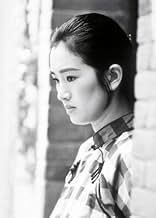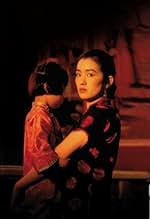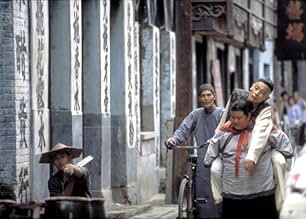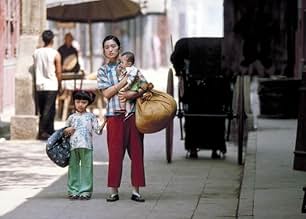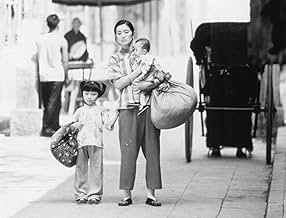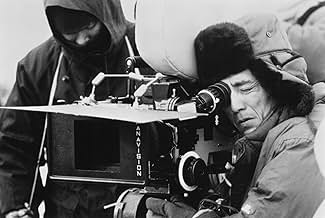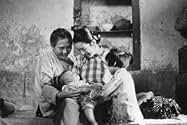Depois que Fugui e Jiazhen perdem suas fortunas pessoais, eles formam uma família e sobreviveram às difíceis mudanças culturais entre as décadas de 1940 a 1970, na China.Depois que Fugui e Jiazhen perdem suas fortunas pessoais, eles formam uma família e sobreviveram às difíceis mudanças culturais entre as décadas de 1940 a 1970, na China.Depois que Fugui e Jiazhen perdem suas fortunas pessoais, eles formam uma família e sobreviveram às difíceis mudanças culturais entre as décadas de 1940 a 1970, na China.
- Ganhou 1 prêmio BAFTA
- 5 vitórias e 6 indicações no total
Avaliações em destaque
Most Chinese who lived through Mao's Revolution say this film tells it like it was at the simple townsperson level. Though it can serve as an overview of Chinese history 1944 to 1970 or so, unlike Lean's "Gandhi" or "Lawrence of Arabia", this is not a hero's biopic. Instead we see a foolish, once rich but now fallen heir and his wife blown about by the winds of fortune for three decades and challenged as parents trying to raise two children under increasingly harsh and punitive communist tyranny. What you sense in this film, that I've never seen before in any Chinese film, is how the ethical and moral principles that have prevailed in Chinese culture for 2500 years - a mix of transcendence and pragmatism, humility and grit, cosmic harmonic balance and social duty - allows an ordinary couple to accept unbearable tragedy and keep going. It also shows what this survival strategy costs them in their Communist context. The screenplay is full of cosmic irony. It makes us aware, without shouting, that this is just one family among millions. As Yimou's transitional screen message says: "...leaving no family unaffected". It is to that extent, a tribute film.
Maybe ten hours of Kieslowski's "Decalogue" might accomplish the same broad survey of of human happenstance and emotion. Maybe Kurosawa in three or four hours. But never in two plus hours have I seen the scope Zhang Yimou achieves here. "To Live" also contains as wise a moral lesson as any film I've seen, and it's a gentle one despite the surrounding violence. I couldn't paraphrase the lesson for you. I wouldn't try. Just watch. It will reach you non-verbally in about 90 minutes. Just know, this isn't Shakespeare, Hollywood or soap opera. It's something else.
Gong Li's work is as powerful as anything Streep or Sarandon have ever done in the west - which is all the more inspiring since the camera doesn't lavish star-level attention on her. As her husband, Ge You turns in an emotionally riveting, charming, sometimes funny and devastatingly honest performance. The direction is sure handed, the shooting unfailingly gorgeous. Zhang Yimou's cinematic canvass has never been so big or his palette so colorful and controlled. Full of spectacle, great sweeps of time and onrushing tides of humanity, "To Live" is still, in the end, a sweet and poignant epic with an intimate, observant heart. Great story telling. Do not miss! Try to view a letterbox version on a big screen.
I watched this movie because I was taking a class on the politics of China. When I saw that this movie covered such an expansive time period I thought "great, I will learn something." That I did. I cried, I cheered, I stayed up very late... I made my then future husband watch it... he liked it too, not as much as I do.
I tell everyone in conversations about movies that this one is my all time favorite. It took the place of American Beauty, a movie that I have watched about eleven times.
So, I recommend it. If I had a lot of money I would pay people to watch this. It is THAT great.
What I think Zhang Yimou's message here is that the will of the people "to live," as in the title, to survive and overcome obstacles is what defines the Chinese people. They ride the ox of communism as a boat rides a wave. They adapt.
Consider that tall and thin Fugui (played with consummate skill by You Ge) says that a chick will become a chicken when it grows up, and then a sheep and then an ox and then the Communist Party. But as the film ends he tells his grandson only that the chick will become a chicken and then a sheep and then an ox. He doesn't mention communism. In this way we know that the people have tamed the ox.
Zhang's film is an epic parable of life in China in the 20th century. It opens before the communist revolution with protagonist Fugui as a wayward son who is gambling the family fortune away. His wife, Jiazhen (Gong Li) pleads with him to stop, but he cannot. He is addicted to vice. Symbolically he represents the old regime. He loses everything, wife included and goes to live in the streets. After some time the revolutionary war begins and he and his friends find it convenient to switch sides and join the revolutionary army--he as an entertainer for the troops, a puppeteer. He and wife reunite and become loyal and even enthusiastic communists. He is lucky to have lost his fortune for now he is recognized as a hero of the revolution, while the man who won his family's house at dice is declared a counter-revolutionary and meets a bad end.
As in every Zhang Yimou film I have seen, everything is beautifully and exquisitely done. His work is characterized by an artist's sense of color and form, by an engaging simplicity in the telling, and by a subtle sense of what is going on politically, and especially by a deep and abiding sense of humanity. Here the transformation of Chinese society from feudalism to communism to the capitalist/communism hybrid that exists today is shown through the eyes and experiences of the people; and what is emphasized is the endurance and the will of the people to survive, adapt and finally to flourish regardless of who might be in power.
I would compare Zhang Yimou to the very greatest directors, say, to Stanley Kubrick, to Francis Ford Coppola, to Louis Malle, to Krzysztof Kieslowski in sheer artistic talent. Like Malle he is warm and honest about human beings and what they do without being maudlin or sentimental. Like Coppola he has an epic-maker's vision, and like the Coppola of the Godfather films, a strong sense of family. Like Kubrick he is creative and always aware of the needs of the audience, and like Kieslowski he is clever.
This is in some respects Zhang Yimou's finest achievement because of the way he tells the story of communism in China. I am reminded of the way Louis Malle tells the truth about human sexuality without inciting the censors. Here Zhang Yimou tells the truth about the communist experience in China, subtly demonstrating its cruelties and stupidities without, amazing enough, incurring the wrath of the authorities. (Some of his films have been banned in China, but I understand they are readily available nonetheless.) Here the kids are smiling and happy as they work in the steel mill. The accident that kills Fugui's son is seen as just that, an accident and not the fault of the "Great Leap Forward." The members of the educated class, who are ridiculed, beaten and banished (and worse) during the "Cultural Revolution," accept their fate as their just deserts--the doctor who insists that it is better to wear the placard shaming him that is hung from around his neck than it is to take it off. The local official who has preached and practiced the communist line faithfully, who finds himself being labeled a capitalist, also accepts his fate as though in doing so he is furthering a cause larger than himself.
In a way Zhang Yimou's international celebrity and reputation as one of the world's greatest film makers protects him. In another sense his depictions of the sins and excesses of the old regime before communism are so well done and appreciated by all, that such an expression also protects him.
Nonetheless, I do not personally consider this Zhang Yimou's best film. I prefer the startling beauty of Raise the Red Lantern (1991) and Red Sorghum (1987) as well as the charming Not One Less (1999) or the simple but powerful, The Story of Qiu Ju. However, this is an outstanding film.
Notable in a supporting role is Wu Jiang as Wan Erxi the strong young man with the limp who marries the mute daughter. I have seen him in Shower (1999) in which his personal charisma and strength of character are shown more fully. He is the younger brother of Wan Jiang who starred in Zhang Yimou's first film, Red Sorghum. Of course Gong Li, one of the finest actresses of our time, who is often featured in Zhang Yimou's films, is outstanding as always.
(Note: Over 500 of my movie reviews are now available in my book "Cut to the Chaise Lounge or I Can't Believe I Swallowed the Remote!" Get it at Amazon!)
But this film is so beautiful and so real, that it's unbearably heartbreaking at times. Every time I watch it, and I know a particular heartbreaking scene is coming up, I almost want to turn it off, but I'm just frozen in place, forced to experience the pain of the people on screen, that I've traveled three decades with. Zhang's understanding of the people of China, and the tragedy of history is full of empathy, respect, and adoration. In every scene, Gong Li embodies strength and beauty. Zhang's study of communism and of the Chinese government, isn't a villifying one sided argument, but one with complete understanding of the tragedy of this huge social experiment, that effected not only China, but the whole world.
As a Korean American, I draw some appreciation at the parallel effects on Communism on Korea. Mao-Kim, Taiwan-SouthKorea. But this is a truly universal movie, and anyone would enjoy it.
I watched this movie because it had won the top award at Cannes. I hadn't high hopes for some reason, but I figured it was worth a look. I am very glad I did because it is a wonderful little piece that can be enjoyed with little knowledge of the regime against which it is set. The story follows the family's misfortunes and how they are affected by the rise of Chairman Mao. Their plight is touching as they suffer wrongs but also show compassion on others all the while trying to do the right thing by the system that is impacting on them. Even when tragedy occurs they never blame Communism but heap it on themselves instead.
This unfolds over many years with the rise of Mao as the backdrop. The parrellel between the two things is clear without being forced or rammed down our throats it's a wonderful bit of handling. Even better is the infusion of comic touches all the way through, the dialogue (even in subtitle form) is great and is witty and touching I laughed out loud many times.
Not having seen any other films by Zhang, I can only hope they are as good as this one. The cast, too, do a great job with the film. You Ge's Fugui is fabulous he is a draw from the start on, and his ageing is so convincing that credit must go not only to the makeup but also to Ge for doing so well with potentially tragic figure. Likewise Gong is superb but ages less convincingly. The support cast are all good from the children through to the figures of Mao like Jiang and Niu. The only thing that saddened me about the two great leads is to think that Western cinema will never care to have them in any films I guess that when it comes to Hong Kong cinema Hollywood only are interested if it has slow-motion and guns! (and they think they're cutting edge!)
Overall I find it very hard to fault this film as it has so much going for it on so many levels. Just as a human story it is excellent, and the historical context only serves to make it better. Comic and touching right to it's perfectly pitched close, this should be searched out by anyone who wants a genuinely moving human tale with political comment sown into each frame without intrusion.
Você sabia?
- CuriosidadesInitially, Director Zhang Yimou was forbidden from filmmaking for 5 years by the Chinese Communist Party as a result of making this film. However, due to outside pressure this was later withdrawn.
- Citações
Little Bun: [playing with chickens] When will they grow up?
Xu Jiazhen: Very soon.
Little Bun: And then?
Xu Fugui: And then... the chickens will turn into geese... and the geese will turn into sheep... and the sheep will turn into oxen.
Little Bun: And after the oxen?
Xu Fugui: After oxen...
Xu Jiazhen: After oxen, Little Bun will grow up.
Little Bun: I want to ride on an ox's back.
Xu Jiazhen: You will ride on an ox's back.
Xu Fugui: Little Bun won't ride on an ox... he'll ride trains and planes... and life will get better and better.
Principais escolhas
- How long is To Live?Fornecido pela Alexa
Detalhes
Bilheteria
- Faturamento bruto nos EUA e Canadá
- US$ 2.332.728
- Fim de semana de estreia nos EUA e Canadá
- US$ 32.900
- 20 de nov. de 1994
- Faturamento bruto mundial
- US$ 2.332.728
- Tempo de duração
- 2 h 13 min(133 min)
- Cor
- Mixagem de som
- Proporção
- 1.85 : 1


